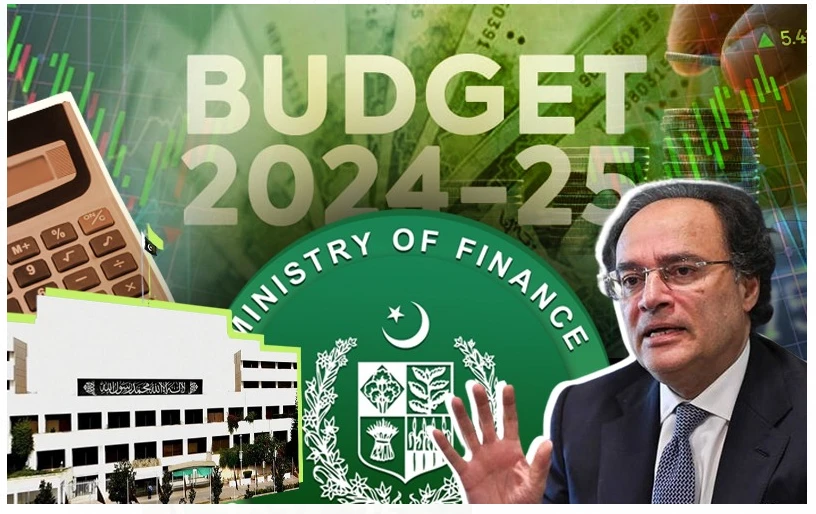Growth-focussed Rs18.9 trillion federal budget 2024-25 to be unveiled today

Stay tuned with 24 News HD Android App

Amid fears of introduction of new taxes, the incumbent government is all set to unveil its first growth-oriented federal budget for the fiscal year 2024-25, with an estimated outlay of over Rs18 trillion, today, reported 24NewsHD TV channel.
The deficit budget for fiscal year 2024-25 will be presented before the National Assembly by Federal Minister for Finance and Revenue Senator Muhammad Aurangzeb.
Budget session
The budget session of the National Assembly will be set into motion at 4:00 pm with a four-point agenda.
The session will start with recitation of Holy Quran followed by naat and national anthem.
The finance minister will also present the annual budget statement for the financial year 2024-25 including the revised estimates. Demands for funds and appropriations for the fiscal year 2024-25 will be placed before the House.
The formal and technical supplementary approvals for the financial years 2022-23, 2024 and 2025 will also be submitted.
Focus on growth
The budget had been formulated while considering the existing challenges being faced by the economy at domestic and international fronts. Hence, mitigating people’s sufferings, transforming agriculture sector, promoting Information Technology (IT), boosting exports, promoting industrial growth and bolstering businesses, would be the main focus of the document.
In addition to fiscal management, revenue mobilization, measures for economic stabilization and growth, reduction in non-development expenditures, job creation and people-friendly policies for the socioeconomic prosperity of the country, would feature in the budget. It would also focus on social sector development besides introducing reforms for improving governance and boosting the private sector for investment.
On the revenue side, the government would introduce measures for bringing improvements in the system of tax collection, broadening the tax base, and facilitation to tax-payers. Keeping in view the robust growth of revenues during the current fiscal year (2023-24), the government is likely to set the revenue collection target at over Rs12 trillion for the fiscal year 2024-25.
Amid inflationary trends still strong in the markets, the government is expected to increase the salaries of government employees by 10 to 15 percent increase in salaries. A hike of 10-15 percent is also expected in pensions of retired employees.

Tax collection target
The Federal Board of Revenue (FBR) has set an ambitious tax collection target of Rs12,970 billion.
Salaries and Pensions
Government employees can expect a 10 to 15 percent increase in their salaries and pensions. The increment is anticipated to provide significant relief, especially to lower-grade employees.
BISP and Social Welfare
The budget proposes an increase in the number of beneficiaries under the Benazir Income Support Programme (BISP) and an enhancement in the stipend amounts, aiming to support the most vulnerable segments of society.
Defence and security
An allocation of Rs1,252 billion has been proposed for the defence sector to ensure national security and support the armed forces.
Deficit and debt servicing
The budget outlines a financial deficit of 9,800 billion rupees. Additionally, Rs9,700 billion has been allocated for interest payments on existing debt, reflecting the government's commitment to managing its financial obligations.
New taxes and IMF demands
To meet the International Monetary Fund (IMF) requirements, the budget introduces several additional taxes. This includes potential increases in the prices of old imported vehicles, imported mobile phones, and cigarettes.
Cost of living adjustments
Imported food items, baby milk, medicines, and stationery are expected to become more expensive due to the proposed elimination of sales tax exemptions on thousands of goods.
Agricultural implements, tractors, fertilizers, and seeds may also see price hikes, affecting the agriculture sector.
GST Increase
The GST rate is proposed to increase from 18% to 19%, which is expected to generate an additional 100 billion rupees in revenue.
Petroleum development levy
The levy on petroleum products is proposed to rise from Rs. 60 to Rs. 80 per litre, potentially increasing fuel prices across the country.
The new budget aims to balance fiscal responsibility with social welfare, though the introduction of new taxes and reduction of exemptions may lead to higher costs for consumers.
As the budget proposals are debated in the National Assembly, the government will need to navigate the challenges of satisfying IMF conditions while ensuring economic relief for its citizens.
Reporter: Rozina Ali
